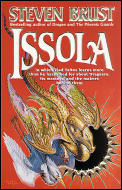
| Series: | Vlad Taltos #9 |
| Publisher: | Tor |
| Copyright: | July 2001 |
| Printing: | December 2002 |
| ISBN: | 0-8125-8917-3 |
| Format: | Mass market |
| Pages: | 255 |
Issola is the ninth book of the Vlad Taltos series and continues the main storyline, rather than filling in earlier events. It's therefore a direct sequel to Orca, but it takes place a while later and refers to past events only obliquely. It's probably possible to start the series here at a pinch, although I recommend reading the earlier books first.
This is more like it. I found Issola much more satisfying than Dragon: we keep the development in Vlad's character, we're back to a plot directly involving magic, Vlad's Dragon friends play a large role, and we get quite a bit more detail about the world background. For once, Vlad finally asks for and gets an explanation rather than telling everyone to skip the details, and the result is an eye-opening history lesson from Sethra Lavode that clears up several mysteries about the order of the Dragaeran universe.
The flaw in this, unfortunately, is that in creating some major villains and a science fiction explanation for Vlad's universe, Brust turns to a race that struck me as a science fiction cliche. The Jenoine simply aren't as interesting as the rest of Brust's mythology, and at times they and the strangely artificial world on which Vlad finds himself for much of the book felt like something out of an old Star Trek episode. It's a bad sign when I'm picturing 1960s special effects when reading settings and villain descriptions.
Brust makes up for it, though, with his lovely portrayal of gods, particularly of Verra. She is an excellent character. Her attitude towards Vlad and towards the Dragaerans and the way that she affects conversation has just enough power and authority to validate the Easterner perspective, with just enough fallible characterization to validate the Dragaeran perspective. We also find out considerably more about Lady Teldra in this story (she is the Issola for which the book is titled), and she makes even the Jenoine more interesting by interacting with them. Despite a bit of a clunker of a puzzle world, I was more engrossed in this story than most of the books of this series. The ending is exceptional, providing not only a satisfying fight scene and an opportunity for Vlad to be clever but some sharp emotion, a great bit of magic and world mythology, an excellent plot seed for future stories, and a breakthrough in the stasis that's dominated the main plot of the series since Phoenix.
I can see why people prefer Orca, and I still have to give it a slight edge as my favorite of the series, but I enjoy the magic-intensive plots and world background as much or more than Vlad doing his Jhereg thing. When Brust bothers to explain his world background, he does a great job with world-building, even with a few sour notes like the Jenoine (and even the Jenoine have some neat bits and potential for improvement). I think this series is getting better as it goes along, which is remarkable thing to say after the ninth book. (It helps that Brust keeps each book under 300 pages and tells a tight story, rather than sprawling out and revealing all of his neat ideas early.) If he can keep this up while dropping the Star Trek feeling, the next book should be even better.
Followed by Dzur.
Reviewed: 2008-10-22